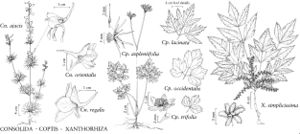Coptis
Trans. Linn. Soc. London 8:305. 1807.
Herbs, perennial, from orange, yellow, or pale-brown, slender rhizomes 0.5-2 mm thick. Leaves basal, petiolate. Leaf-blade 1-2-ternately compound, 1-2-pinnately compound, or deeply divided; leaflets ovate or triangular, lobed or parted, margins sharply serrate to denticulate. Inflorescences scapose, 1-4-flowered cymes, to 3 cm (9 cm in fruit); bracts absent. Flowers bisexual and staminate (all bisexual in C. trifoliata), radially symmetric; sepals not persistent in fruit, 5-7, green to white, plane, linear-lanceolate, oblanceolate to obovate or elliptic, occasionally clawed, 4.2-11 mm; petals 5-7, distinct, green, plane or concave distally, either clavate with adaxial nectary at apex or linear with adaxial nectary near base, clawed, 2-7 mm; stamens 10-60; filaments filiform; staminodes absent between stamens and pistils; pistils 4-15, simple; ovules 4-10 per pistil; style present. Fruits follicles, aggregate, stipitate, forming umbellike clusters, oblong to ellipsoid, sides not veined; beak present or absent, terminal, straight or apically hooked, 0-4 mm. Seeds dark-brown to tan, ellipsoid, shiny, often appearing wrinkled. x=9.
Distribution
Temperate and boreal regions of North America and Asia
Discussion
Species ca. 10 (4 in the flora).
Selected References
None.
Key
| 1 | Leaflets unlobed or slightly lobed, ± sessile; sepals oblanceolate to obovate or elliptic; nectary near apex of petal; follicle body 3.9–7 mm; beak straight to ascending in fruit, 2–4 mm. | Coptis trifolia |
| 1 | Leaflets deeply lobed or pinnatifid, short- to long-petiolulate; sepals linear-lanceolate; nectary near base of petal; follicle body 7–13.5 mm; beak recurved in fruit, less than 1 mm. | > 2 |
| 2 | Leaf blade 2-pinnate with pinnatifid leaflets, to 3-pinnate or occasionally 2-ternate; coastal British Columbia to Alaska. | Coptis aspleniifolia |
| 2 | Leaf blade (1–)2-ternate; sw Washington s to California, e to Montana. | > 3 |
| 3 | Flowers nodding; leaf blade 2-ternate or ternate with leaflets lobed almost to base; coastal Washington to California. | Coptis laciniata |
| 3 | Flowers erect; leaf blade ternate with leaflets lobed ca. 1/2 length to base; Rocky Mountains of Washington, Idaho, and Montana. | Coptis occidentalis |
